Use of the dictionary to stimulate literacy and language development // Uso del diccionario para estimular la lectoescritura y lenguaje. [ESP - ENG]
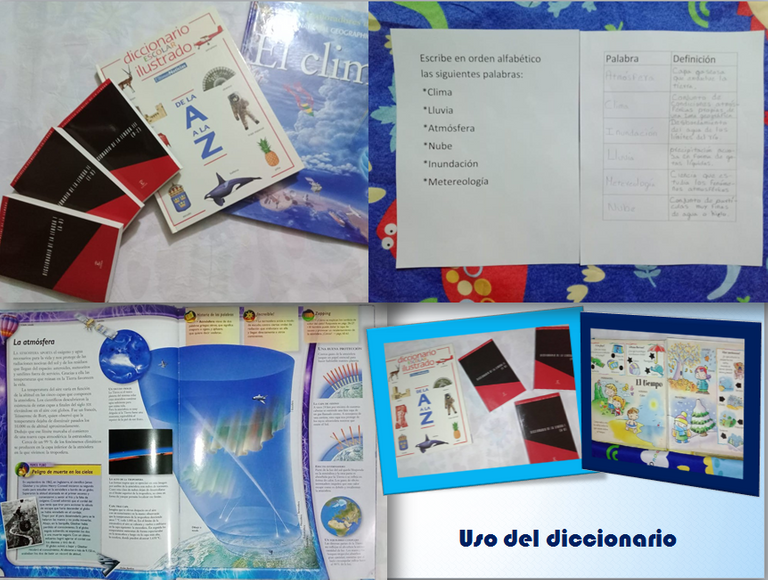
Greetings to the parents of this beautiful community, it is a pleasure to share with you again, an activity that I did with my son, it is about ordering words in alphabetical order and look for the meaning in the dictionary, it is aimed at children between 8 and 10 years old who have already started reading and writing; the purpose is that children learn the use of the dictionary and its importance for the understanding of words or terms that progressively as they advance in their learning process will be incorporated into their vocabulary.
The dictionary is a book that compiles the words of a given language, organized in alphabetical order, with their respective definitions, we can also learn how to spell words correctly (according to the illustrated school dictionary).
Dictionaries are classified into : Dictionaries of the language, synonyms and antonyms, bilingual, encyclopedic, etymological, among others, in this opportunity we work with the dictionary of the language, which cover a language, describing the meaning of their words.
Saludos a los padres y madres de esta hermosa comunidad, es grato compartir nuevamente con ustedes, una actividad que realicé con mi hijo, se trata de ordenar palabras en orden alfabético y buscar el significado en el diccionario, está dirigida a niños con edades comprendidas entre los 8 y 10 años que ya han iniciado la lectoescritura; la finalidad es que los niños aprendan el uso del diccionario y su importancia para la comprensión de palabras o términos que progresivamente a medida que avance en su proceso de aprendizaje irá incorporando en su vocabulario.
El diccionario es un libro, que recopila las palabras de una lengua determinada, organizadas en orden alfabético, con sus respectivas definiciones, además podemos aprender como se escriben correctamente las palabras (de acuerdo con el diccionario escolar ilustrado)
Los diccionarios se clasifican en : Diccionarios de la lengua, sinónimos y antónimos, bilingüe, enciclopédico , etimológico, entre otros, en esta oportunidad trabajamos con el diccionario de la lengua, el cual abarca un idioma, describiendo el significado de sus palabras.
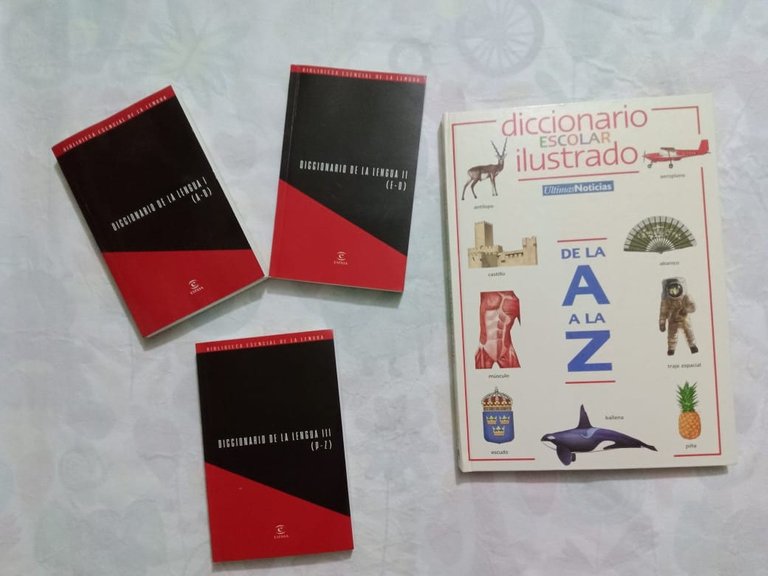
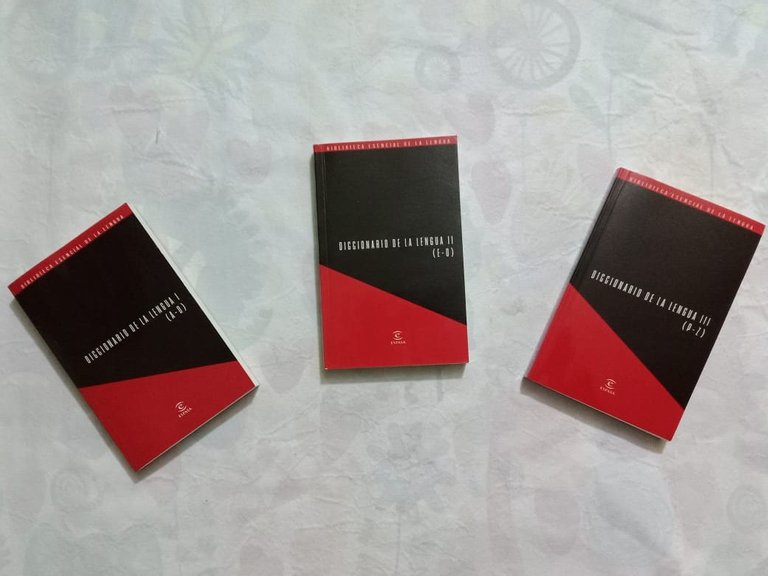

The activity we do is to order a series of words alphabetically and then look up the meaning in the dictionary, for a better understanding, with the help of images, we explain to the child the definitions of each word.
La actividad que realizamos consiste en ordenar una serie de palabras alfabéticamente y luego buscar el significado en el diccionario, para una mejor comprensión, con ayuda de imágenes, explicamos al niño las definiciones de cada palabra.
.
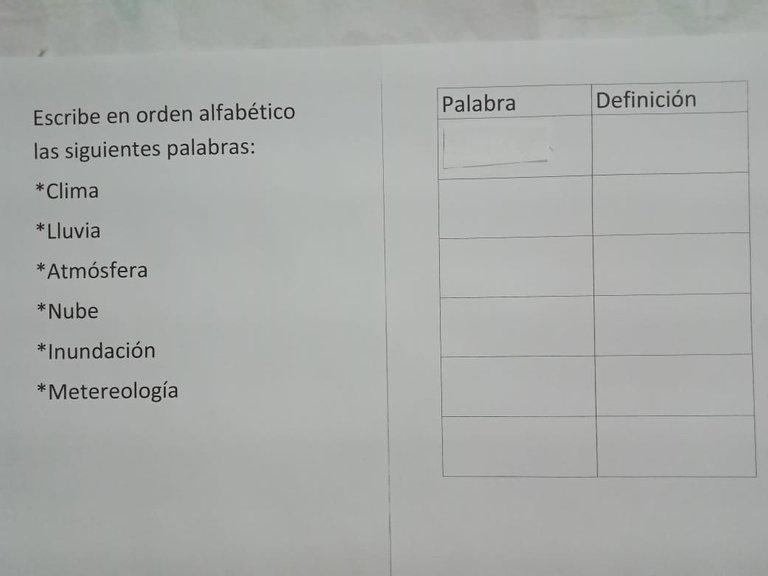
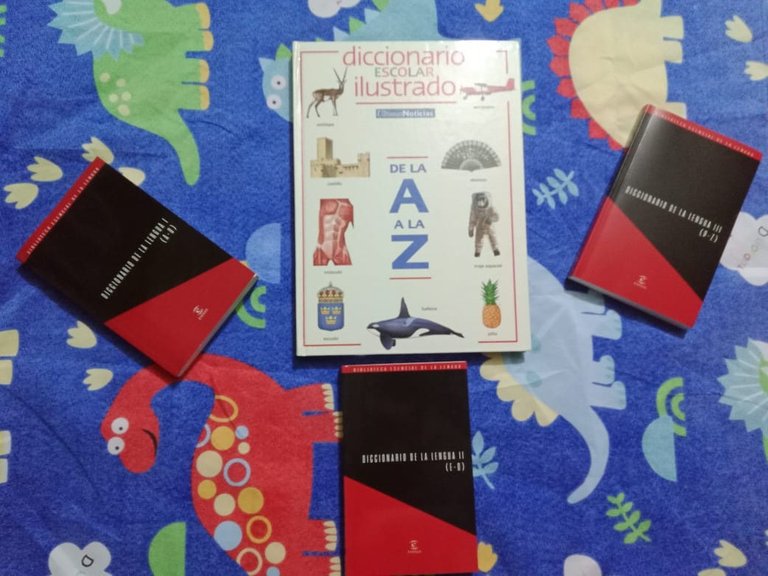
Once the work material is handed out, the child will organize the words in alphabetical order and write them in the corresponding box. With this activity the child exercises memorization, concentration and motor skills.
Entregado el material de trabajo, el niño organizará las palabras en orden alfabético y la escribe en la casilla correspondiente, con esta actividad el niño ejercita la memorización, concentración y motricidad.
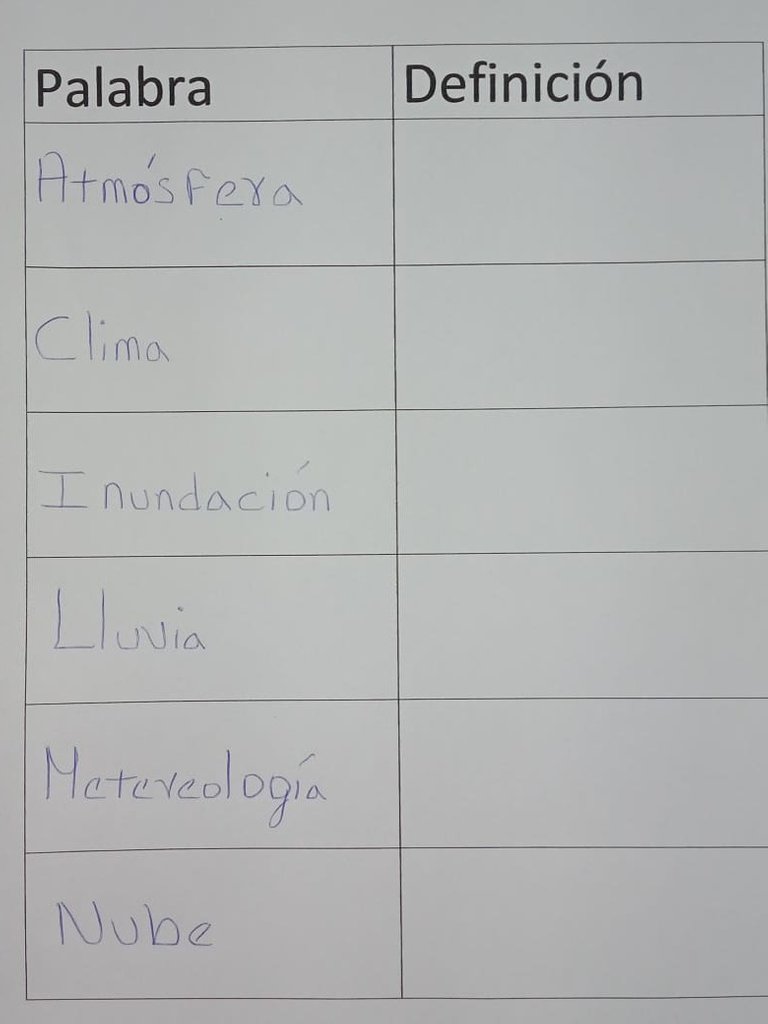
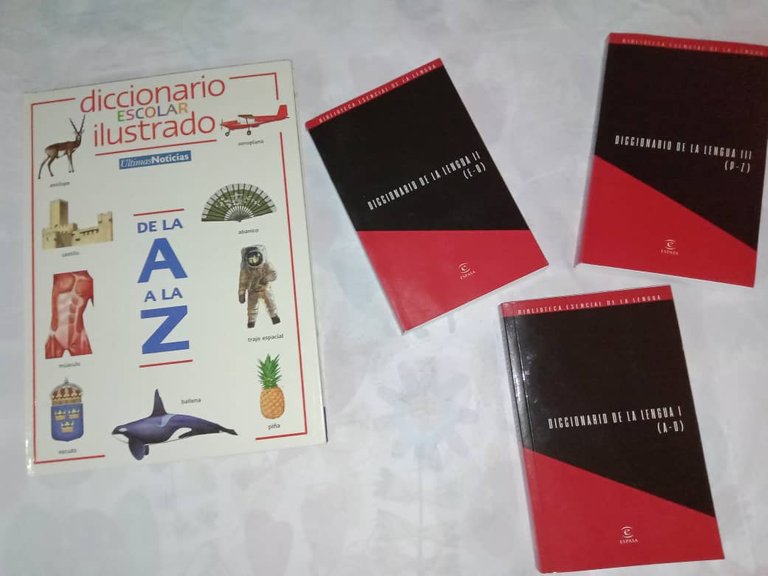
Once the words are organized, the meaning of each one of them is looked up in the dictionary, we guide the child on how to use the dictionary, remembering that the words are arranged in alphabetical order, if required we help him/her to look up a word and successively he/she will look up the others, until all the terms are defined.
Ya organizadas las palabras se busca el significado de cada una de ellas en el diccionario, le orientamos como usar el diccionario, recordando que las palabras están ordenadas en orden alfabético, si lo requiere le ayudamos a buscar una palabra y sucesivamente él buscará las otras, hasta definir todos los términos.
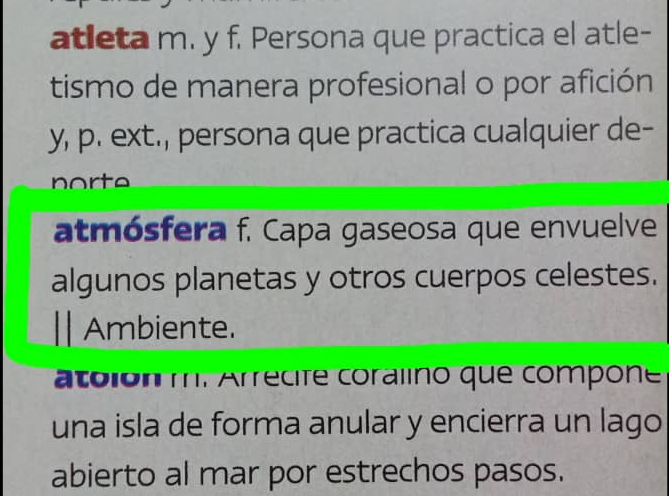
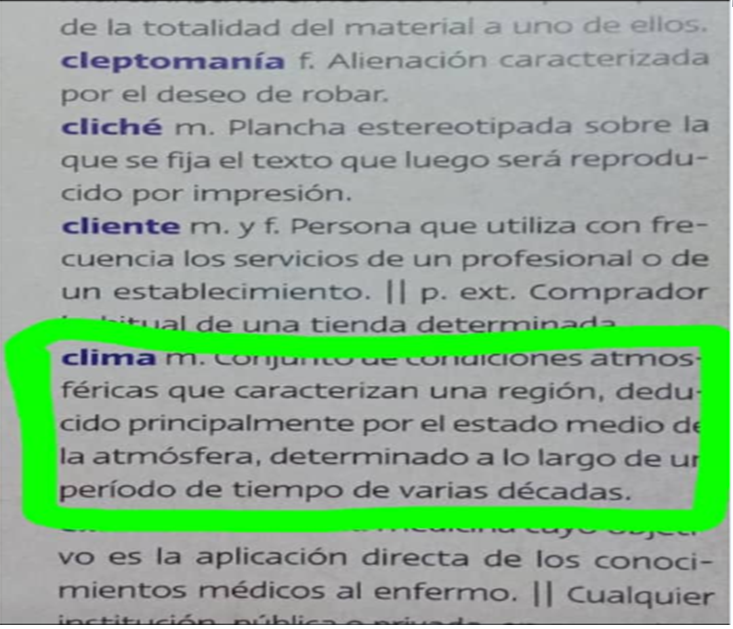
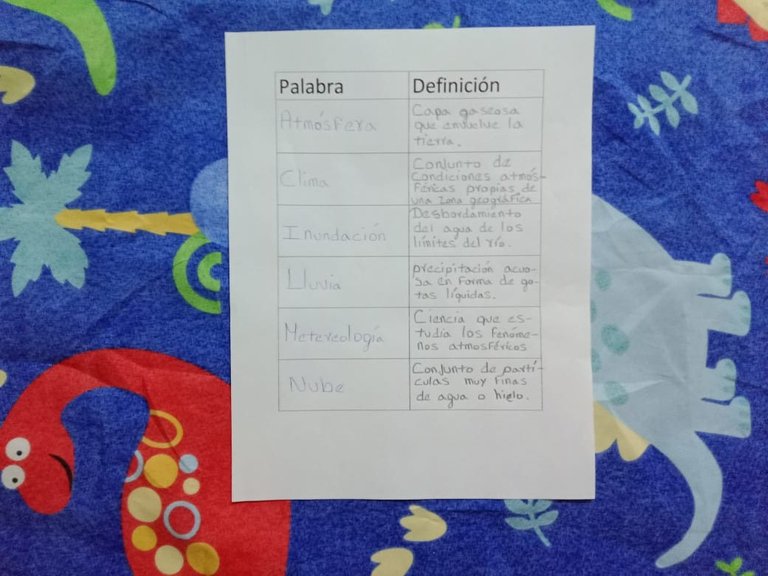

We explain each word with images and small illustrated readings that help the child to understand the definition of each word, in the words atmosphere and climate we ask questions such as why are there hot days and cool days? why is the atmosphere important? among other questions that allow the child to express what he understands about the words and how they relate to each other.
Explicamos cada palabra con imágenes y pequeñas lecturas ilustradas que ayuden al niño a comprender la definición de cada palabra, en las palabras atmósfera y clima le hacemos preguntas como ¿por qué hay días calurosos y días frescos? ¿por qué es importante la atmósfera? entre otras interrogantes que le permitan expresar lo que comprende de las palabras y como se relacionan entre si.
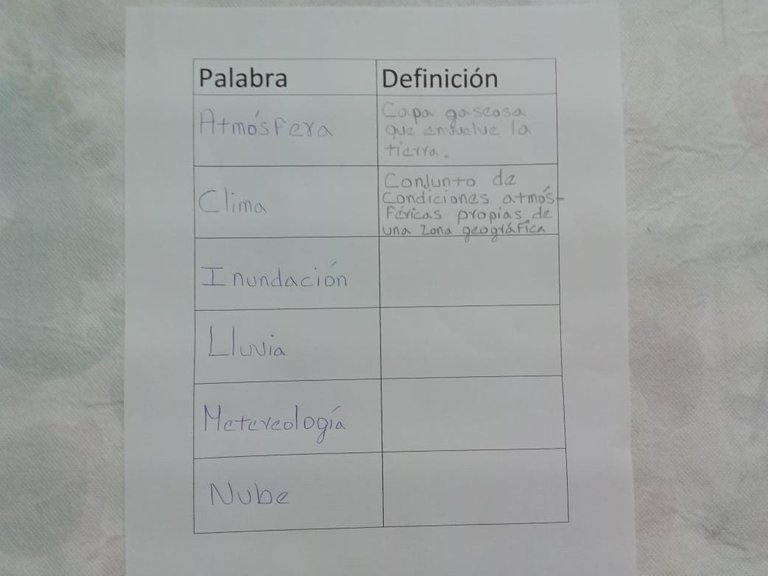
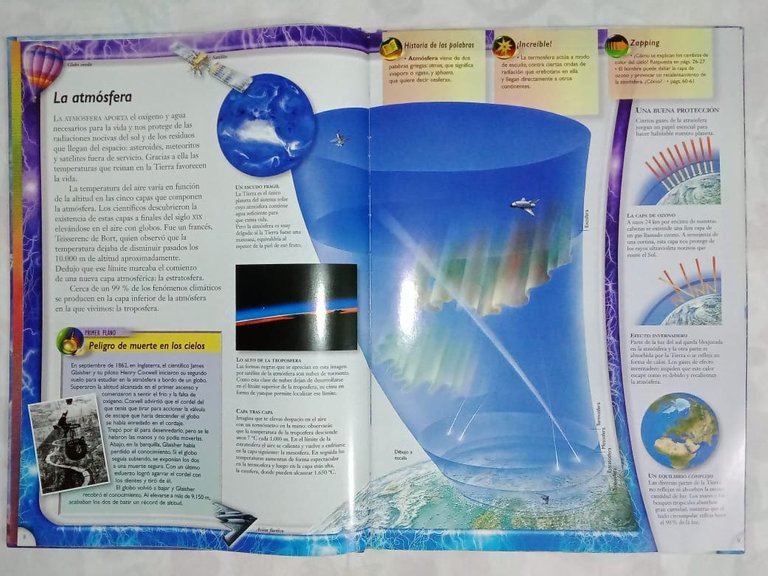
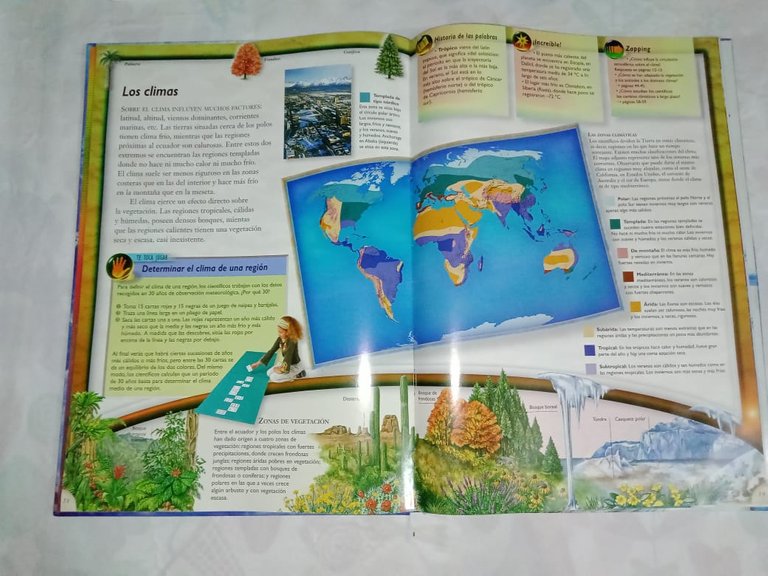
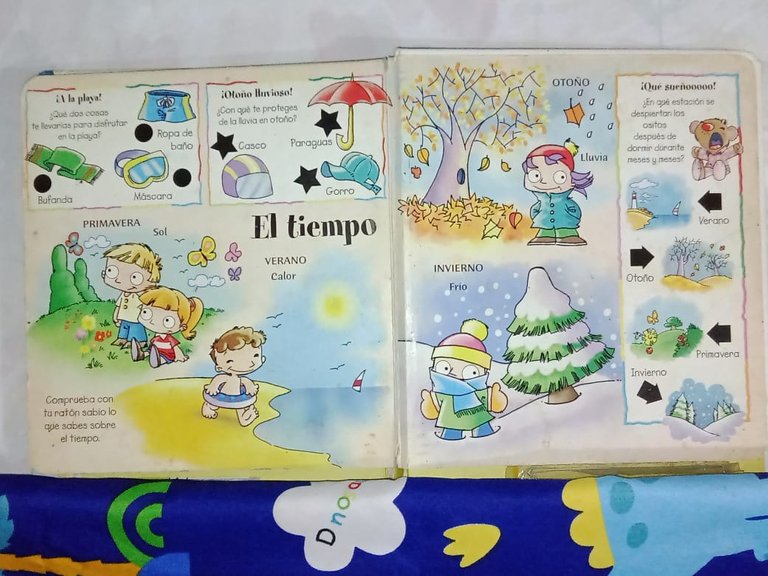
We moved forward with the following words Flood and rain, emphasizing the importance of taking care of the rivers and not building near them or diverting the riverbeds, also because rain is important for the land and agriculture from which we obtain important food.
Avanzamos con las siguientes palabras Inundación y lluvia, haciendo énfasis en la importancia de cuidar los ríos y no construir cerca de ellos o desviar los cauces, también porque es importante la lluvia para la tierra y la agricultura de donde obtenemos importantes alimentos .

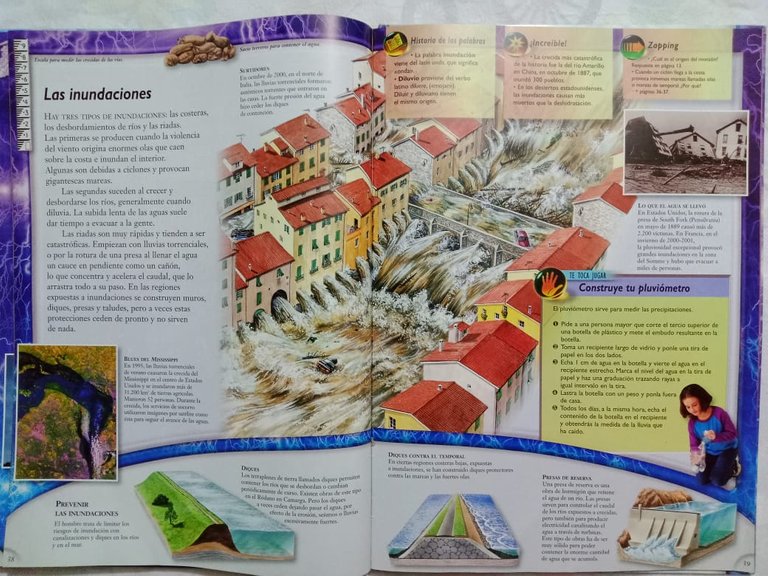
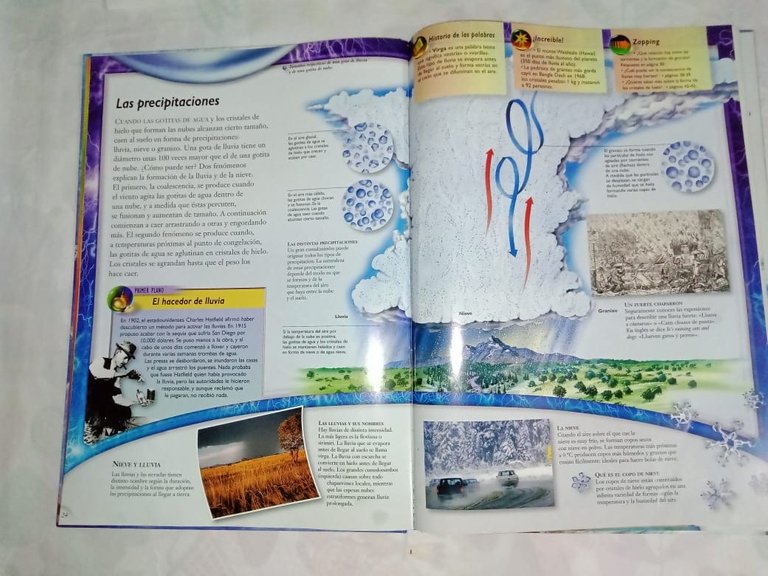
With the terms meteorology and cloud, I asked a series of questions: what color are clouds? Do you know why in the radio and television news they give us a weather report, do you think it is important to listen to these reports? I asked a series of questions: what is the color of the clouds, do you know why on the radio and television news they give us a weather report, do you think it is important to listen to these reports, and so on, to cover all the terms and the relationship between them, each one is closely linked to the other, meteorology allows us to know the state of the weather, the possible rains or precipitation for a given day and the precautions we should take to protect ourselves from the rain and avoid respiratory diseases.
Con los términos metereología y nube, realicé una serie de preguntas: ¿qué color tienen las nubes? , ¿sabes por qué en las noticias de la radio y televisión nos dan un reporte metereológico?, crees que es importante escuchar estos reportes? , así hasta abarcar todos los términos y la relación que existe entre ellos, cada uno está estrechamente vinculado al otro, la metereología nos permite conocer el estado del tiempo climático, las posibles lluvias o precipitaciones para un día determinado y la previsiones que debemos tomar para protegernos de la lluvia y evitar enfermedades respiratorias.

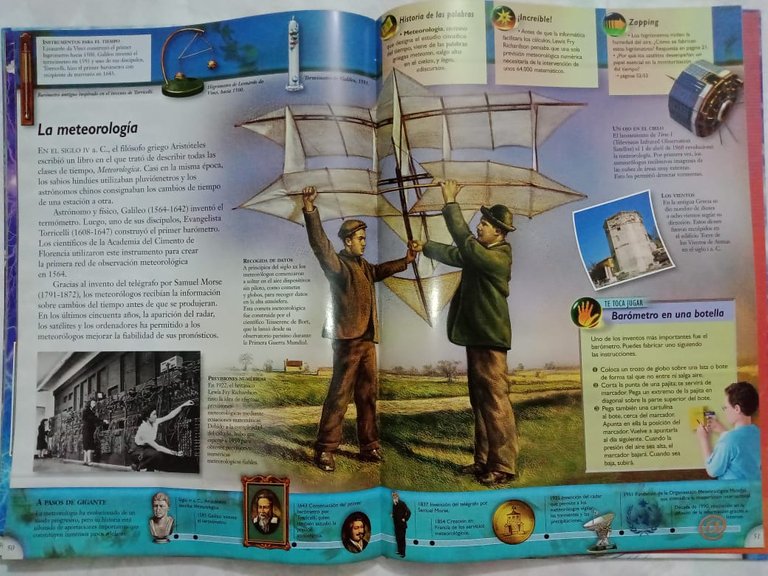
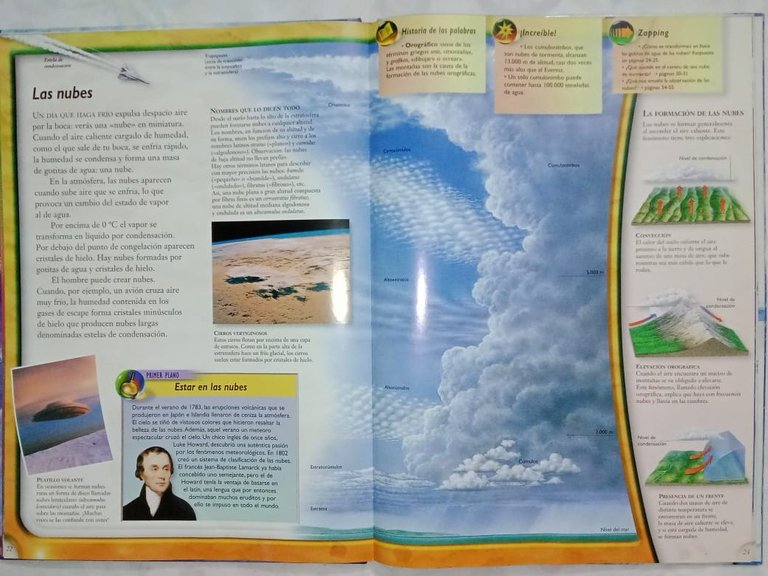

Benefits:
Get to know new words and their meaning
Stimulates memorization and concentration.
Develops reading and writing skills.
Exercises motor skills
Expands vocabulary
Learns the use of the dictionary
Improves spelling
Pronounce words correctly
Increased fluency in speaking and expressing your opinion
Beneficios:
Conoce nuevas palabras y su significado
Estimula la memorización y concentración.
Desarrolla la lectoescritura
Ejercita la motricidad
Amplía el vocabulario
Aprende el uso del diccionario
Mejora la ortografía
Pronuncia correctamente las palabras
Mayor fluidez al hablar y expresar su opinión.
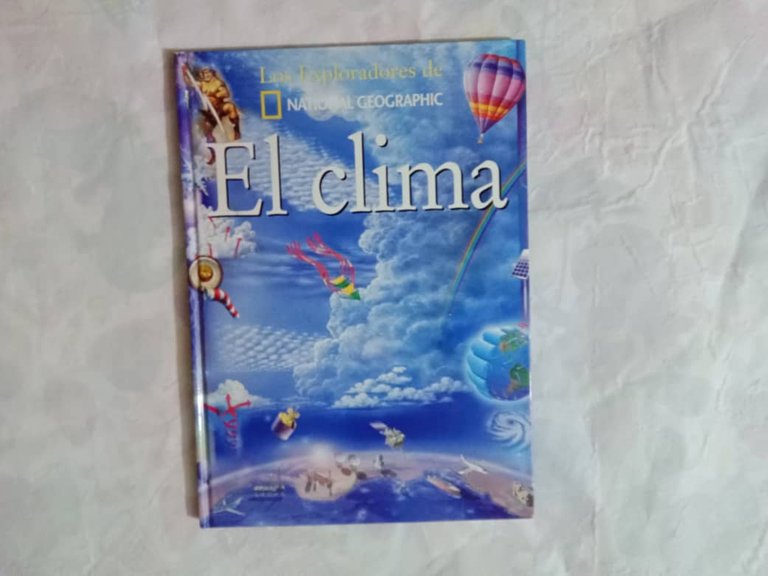
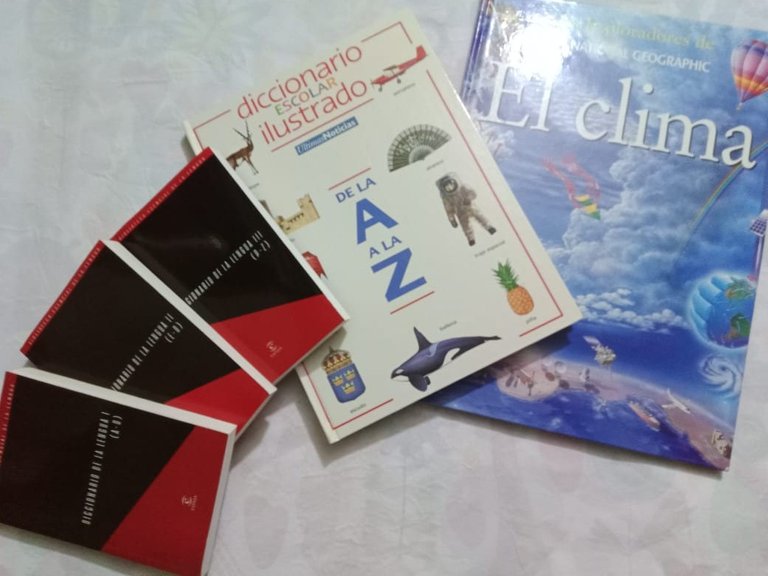
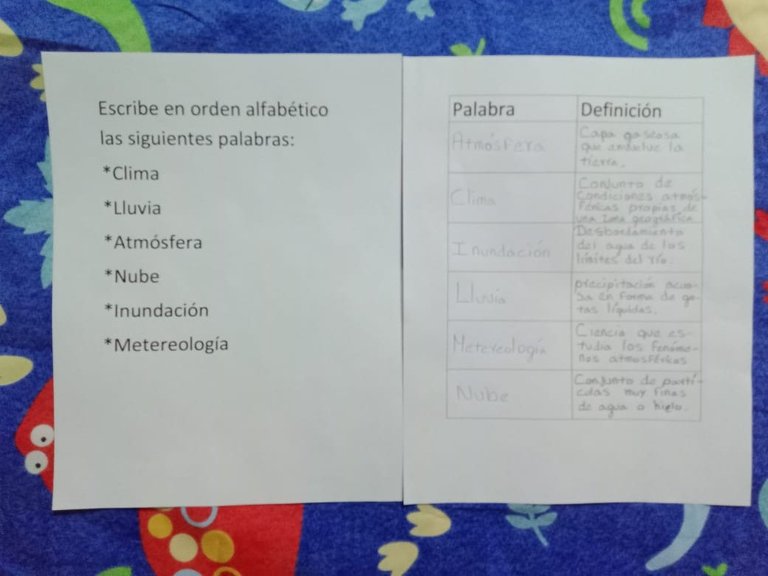



¡Bendiciones!
Blessings!
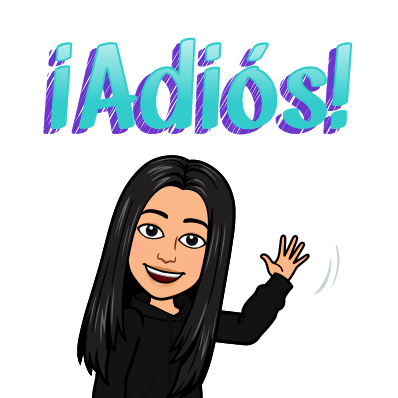
Translated with https://www.deepl.com/translator
All images are my own, captured by a Síragon LC-3000 camera, divisores cortesía de @kattycrochet.
Todas las imágenes son de mi autoría, capturadas por una cámara Síragon LC-3000, dividers courtesy of @kattycrochet.
https://twitter.com/1465404238268403727/status/1589982164132954113
The rewards earned on this comment will go directly to the people( @virgilio07 ) sharing the post on Twitter as long as they are registered with @poshtoken. Sign up at https://hiveposh.com.
I really like this! I have a big dictionary for kids and didnt know how to introduce it to my little boy. We used it several times for many things but didnt really explain to him what a dictionary is. I know he's still small, but he can understand. I guess .... for sure I will try.
I love how you used all those words on climate and weather topic. I think its brilliant how you selected those words and used the dictionary to introduce new words in kid's vocabulary. I will do the same next time I'll have the chance. We often learn based on a theme and I'm sure I can think of a list for our next theme.
Thank you for sharing!
Hello @missdeli, thank you for your beautiful comment, the dictionary is very useful, because in addition to defining the words, you know the synonyms and antonyms; I remember when I was in school my dad taught us to use the dictionary, if you had any doubt how to write a word or its meaning, your best ally was the dictionary, when writing we could substitute words and write fluently.
For children it is very practical, they are attracted to research and new words, with my son the idea came up with the word meteorology, he found it very strange because the news talked a lot about the weather report, when he asked me the meaning, I helped him look in the dictionary and we organized this activity so that in addition to learning the use of the dictionary, he understands all that this science implies and how the words are interrelated and give us a better understanding of a particular topic; I am sure that with your child you will do an incredible activity to teach him/her to use the dictionary with an excellent list of words.
Greetings and blessings!
Agree! I will use ours in no time! My son loves our dictionary already and I think he'll love it more if I explain to him how it works...because I'm sure he can understand it as he know how to read.
I'm sure you will do a great job with your little one using the dictionary and "discovering" new words, I hope to see your publication in the future.
Have a nice day!
This is a great way to teach alphabetical order and looking up words in the dictionary. I bet that it was an educational time and it was fun to see different books with interesting information in them as well. Great job mixing two different types of classes!
Hi @apanamamama, thanks for your visit, knowing the meaning of words broadens language and improves reading comprehension, it was a very productive activity, I was happy to learn that rain is also called precipitation.
Blessings!
Very cool that you even learned something in the lesson! Great job!
Congratulations @belkyscabrera! You have completed the following achievement on the Hive blockchain and have been rewarded with new badge(s):
Your next target is to reach 5000 upvotes.
You can view your badges on your board and compare yourself to others in the Ranking
If you no longer want to receive notifications, reply to this comment with the word
STOPCheck out the last post from @hivebuzz:
Support the HiveBuzz project. Vote for our proposal!
Recuerdo que una de mis cosas favoritas y que desarrollo mucho mi aprendizaje es que todo lo buscaba en el diccionario. Me gusto mucho tu contenido, gracias por compartirlo.
Saludos y bendiciones
Hola @leomarylm, sin duda el diccionario es un gran aliado, para conocer el significado de las palabras y ampliar el vocabulario, también nos permite conocer el origen de las palabras, desde pequeña mi papá me enseñó a utilizar el diccionario y fue de gran ayuda para realizar las tareas.
Bendiciones!
Me parece genial que le hayas dedicado un post al diccionario, un libro muy útil para aprender nuevo vocabulario, así las incluyen en su escritura y discurso oral. Excelente trabajo, amiga. Fue un placer pasar por aquí. Saludos.
Hola @ramisey, gracias por tu hermoso comentario, tal como lo señala es un libro muy útil, que ayuda a los pequeños a mejorar la ortografía, e incluir nuevas palabras en su vocabulario, además ejercitar la lectoescritura.
Bendiciones!